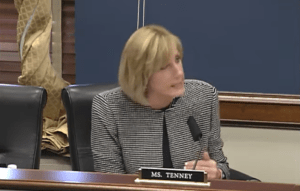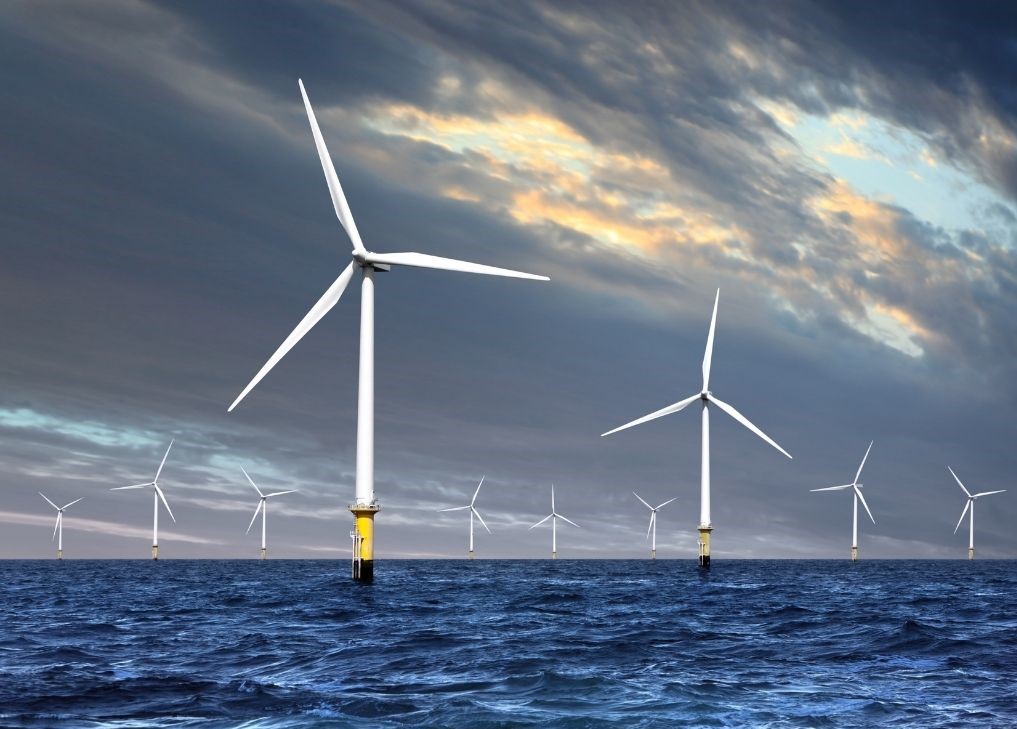In what was billed as a hearing on the green economy for the blue-collar worker in the House Committee on Small Business on Tuesday, both sides spent as much, or more, time debating fossil fuels, inflation, unemployment checks, and taxes than they did sticking to the topic.
Rep. Claudia Tenney (R-NY-22) had the most pointed, relevant question and comment about the post-fossil fuel supply chain. She asked one witness, a consulting and construction firm mostly mounting imported solar panels (as most of our solar is imported), if it would be wiser to source these inputs domestically.

Congresswoman Claudia Tenney: solar supply chain, electric car supply chain needs to be majority made at home.
“The manufacturing of solar panels and EV car batteries are heavily reliant on China,” she said in a question to witness James Hasselbeck, Director of Operations for ReVision Energy, Inc. in South Portland, Maine. “Isn’t it important to have that supply here?” she asked.
“We would advocate for that,” he said. “We think having domestic supply for all materials in the supply chain is a critical part of creating additional jobs and would allow you to manage your cost,” he said.
His comment picks apart some of the environmental activist groups who are pushing for imports of China solar in order to facilitate the fast construction of solar utilities in the United States. They argue that the climate crisis is that bad, that reliance on China for our energy is a non-factor for policymakers.
But ReVision, which is not a manufacturer, and surely installs more Chinese-made solar panels than it does American-made ones, said it would be better to have reliable local supply because global supply disruptions made it “a challenging year to be a (solar) construction company.” He also said that it would be “good to have local rare earth minerals” used for car batteries to be sourced here. Most of it comes from China or is processed by China, as Tenney pointed out.
“We have those supplies here. We have rare earths mined in the U.S., sold entirely to China to be processed and turned into batteries,” Tenney said without mentioning the Mountain Pass mine in California, which is dug up and shipped to China. “It would be great if we did that here,” she said.
Both the House and Senate seem to understand the importance of domestic supply chains for the energy sectors. And President Biden has said that “when I think of climate change I think jobs.” What kind of jobs? Will it be jobs at ReVision installing Chinese-made solar panels and wind turbines made by China’s biggest turbine maker Xinjiang Goldwind (yes, that Xinjiang of Uyghur Muslim ‘genocide’ fame.) We still do not know. For now, America’s solar industry is growing and protected thanks in large part to Section 201 tariffs on solar panels.
Committee Chairman Jason Crow (D-CO-6) said Biden’s clean energy plans are a would-be boon to domestic investment. “By increasing investment in renewables on a macro basis, we can transform the U.S. into a global clean energy leader and reduce our dependence on foreign nations for supply,” he said in his opening remarks. “Going green also has the potential of reinvigorating the labor market by creating millions of good-paying jobs spread out across tens of thousands of businesses.”
Crow said that there are roughly 35,000 “clean energy” companies employing roughly 3 million workers, though this number is misleading as it also includes employees who work in industries that service energy efficiency projects but would generally not be considered clean energy companies.
Witnesses largely agreed that the U.S. did not have the labor force with the science and engineering backgrounds to meet demand. Hasselbeck estimated that the U.S. would need 900,000 more workers to reach President Biden’s 2025 clean energy goals to reduce CO2 levels.
Leticia Colon De Mejias, CEO of Energy Efficiencies Solutions in Connecticut agreed with the labor pool. She started the conversation around the need for vocational training programs, seeing how colleges and high schools were not educating students for some of the hands-on work that can also be learned on the job, without a college degree.
Meijas said that the sector was a good place for minority workers, who as a group have lower levels of college-educated among the population.
“We are not finding Americans who have the skills necessary to work in these careers. So many people are also unaware of these economic opportunities,” Meijas said. See her testimony here.
When it comes to Biden’s plans to emphasize clean energy and climate change, CPA advocates for a strong focus on domestic supply chains. That includes building out new supply that is currently dominated by Asian firms, such as polysilicon for solar cells. We believe building up America’s manufacturing basis will increase employment among Blacks and Latinos who are behind their contemporaries, not just because of education levels, but because of the offshoring of the types of manufacturing jobs that can be learned through apprenticeship and other programs.
Samuel Gilchrist, Western Campaigns Director for the Natural Resources Defense Council in
Denver said that many of the jobs in new energy industries are not in cities. Some 400,000 workers, or 13% of the clean energy workforce, live and work in rural parts of the country. He did not say whether or not they were manufacturing jobs. These could be sales jobs for people selling HVAC equipment made in Mexico, or new LED lightbulbs for public housing, all sourced from China.
A lot of today’s hearing was about small business loans to restaurants, and Biden’s on-again, off-again plans to raise corporate taxes, though this is not supposed to hit small businesses.
Rep Blaine Luetkemeyer (R-MO-3) discussed Federal unemployment benefits keeping people out of the workforce and hurting small to midsized manufacturers as well as restaurants. He blamed some of the supply chain issues facing the country on these generous unemployment benefits.
“Supply chains are broken because people are not going back to work and as a result, there is a shortage of parts, there’s a shortage of truck drivers,” he said, adding that around 1.8 million people decided not to take a job they were recently offered because they could make close to, or more, sitting at home, based on a Morning Consult poll from last week.
“We all want the same things on this committee,” Crow concluded. “We want to create jobs, grow our economy, and address the climate issue all at the same time.”












